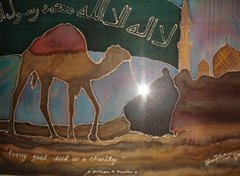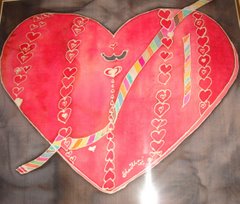
"Advise me! "The Prophet said, "Do not become angry and furious." The man asked (the same) again and again, and the Prophet said in each case, "Do not become angry and furious."
[Al-Bukhari; Vol. 8 No. 137]
Background
This hadith is also related by other scholars of hadith. In another narration, it is related as:
A man came to the Messenger of Allah, sallallahu ‘alayhi wasallam, and said, "Messenger of Allah, teach me some words which I can live by. Do not make them too much for me, lest I forget." The Messenger of Allah, sallallahu ‘alayhi wasallam, said, "Do not be angry." [Abu Daud]
Some scholars say that the Prophet, sallallahu ‘alayhi wasallam, knew that the man who asked him used to get angry often and that is why the Prophet, sallallahu ‘alayhi wasallam, gave him that particular advice. This view may lead to narrowing down and limiting the benefit of the hadith, whereas it is very comprehensive, far-reaching and applicable to all Muslims because everyone is subject to anger.
There are other Qur'anic verses and hadith that emphasize the need to avoid getting angry. Allah mentions the qualities of the muttaqin:
“Those who spend (in Allah’s cause) in prosperity and in adversity, who repress their anger, and who pardon men, verily, Allah loves the al-Muhsinun (the good-doers).”[Surah Al-Imran (3) : Ayah 133-134]
In another hadith, Abu Hurairah related that the Messenger of Allah, sallallahu ‘alayhi wasallam, said:
"A strong person is not the person who throws his adversaries to the ground. A strong person is the person who contains himself when he is angry." [Al-Bukhari; Book 47, No. 47.3.12]
And from the du'a (supplications) of the Prophet, sallallahu ‘alayhi wasallam:
"I ask you O Allah, for truthful speech during times of pleasure and anger" [Nasaai and Ahmad]
Lessons
There are four views, of which two of them are from the earlier scholars and the other two are from the contemporary scholars, about the interpretation of the Prophet's, sallallahu ‘alayhi wasallam, statement "Do not get angry":
A person should learn how to change his character and adapt the characteristics of generosity, kindness, calmness, modesty, patience and forgiving. If a person adapts these qualities, then he may be able to restrain himself when he is about to get angry.
One should not act based on anger or while being angry.
When a person is about to get angry, he should control himself, be patient and not get angry. This is a contemporary view from Sheikh Al-Bitar.
Ustaz Jamaluddin Zarabozo says that the text can be interpreted in the following way: a Muslim must think before acting or speaking. As soon as the feeling of anger appears to oneself, then there is a need to think of why the anger appears and whether it is necessary to be angry. While asking these questions, the person must remember Allah and the Hereafter (Akhirah). This will cause the person to calm down and not get angry.
All these interpretations can be applied as different strategies in handling anger in different
If a person gets angry, then it is necessary that the person performs a muhasabah, which is to account oneself of the mistakes committed, what leads to them and how to overcome them in the future. This is an important training for us to improve ourselves.
In various hadiths, the Prophet, sallallahu ‘alayhi wasallam, teaches us how to control our anger.
The Prophet, sallallahu ‘alayhi wasallam, said, "I know a word, the saying of which will cause him to relax, if he does say it. If he says: 'I seek Refuge with Allah from Satan' then all his anger will go away." [Al-Bukhari; Vol. 4, No. 502]
The Prophet, sallallahu ‘alayhi wasallam, said: "I know a phrase which, if he repeated, he could get rid of this angry feeling." They asked: "What is it, Apostle of Allah?" He replied: "He should say: 'I seek refuge in Allah from the accursed devil.'” [Abu Daud; Book 41, No. 4762]
Therefore one of the keys to controlling ourselves during anger is to seek refuge in Allah from Satan because Satan influence us through the ‘was-was’ that influence our perception. Likewise, Satan promotes evil to people by influencing their perception.
Influencing human perception as a satanic way to promote evil and create disputes among believers has been mentioned in many verses in the Qur'an, for example:
"And say to My servants (that) they should (only) speak that which is the best; (Because) Shaitan verily sows dissensions among them. Surely, Shaitan is an open enemy to man." [Surah Al-Isra' (17) : Ayah 53]
Indeed, if somebody uses a vague word in his speech, then Shaitan ‘whispers’ a wrong interpretation or understanding to the listeners of the speech that may affect the relationship amongst them. This is how relationships in the family, brothers, sisters and friends are severed.
In other hadiths, the Prophet, sallallahu ‘alayhi wasallam, teaches us how to deal with anger:
“Anger comes from the devil, the devil was created of fire, and fire is extinguished only with water; so when one of you becomes angry, he should perform ablution.” [Abu Daud; Book 41, No. 4766]
Abu Dharr narrated: The Apostle of Allah, sallallahu ‘alayhi wasallam, said to us: "When one of you becomes angry while standing, he should sit down. If the anger leaves him, well and good; otherwise he should lie down." [Abu Daud; Book 41, No. 4764]
In another hadith, the Prophet, sallallahu ‘alayhi wasallam, said:
“If one of you becomes angry then he should be silent.”
This is an important advice because during anger, most of our actions and speech may not be correct.
Narrated 'Abdur Rahman bin Abi Bakra: Abu Bakr wrote to his son who was in Sijistan: Do not judge between two persons when you are angry, for I heard the Prophet, sallallahu ‘alayhi wasallam, saying: "A judge should not judge between two persons while he is in an angry mood." [Al-Bukhari; Vol. 9, No. 272]
This hadith is related to the previous hadith (Hadith 15) - it sets out to avoid the judge from making unjust judgement. However, there are praiseworthy anger as known from the examples of the Prophet, sallallahu ‘alayhi wasallam. He never got angry except when the commandments of Allah are violated. However, if we want to get angry for the sake of Allah, then we need to be careful that we: are really not getting angry for ourselves or for our own interests.
need to do it in the right way, like not committing wrong actions or saying vulgar words while getting angry. can achieve the benefit as intended by the shari’ah. If the action leads to more harm than benefit, then it should be avoided based on the principle of weighing between the benefits and harms.
For example, when giving advice, say it in a good way, using good words, and be careful not to get into a quarrel.
It is well known today that anger causes many health problems especially if they are not controlled. There are wisdoms behind shari’ah injunctions and here we find that to control our anger may be beneficial to our health.
conclusion
Socially, this hadith promotes better relationship among people. We need to restrain anger and be patient. We may dislike something in this life but it may have benefits that we do not know.
Our patience towards others who have been harsh on us may later lead them to think and









